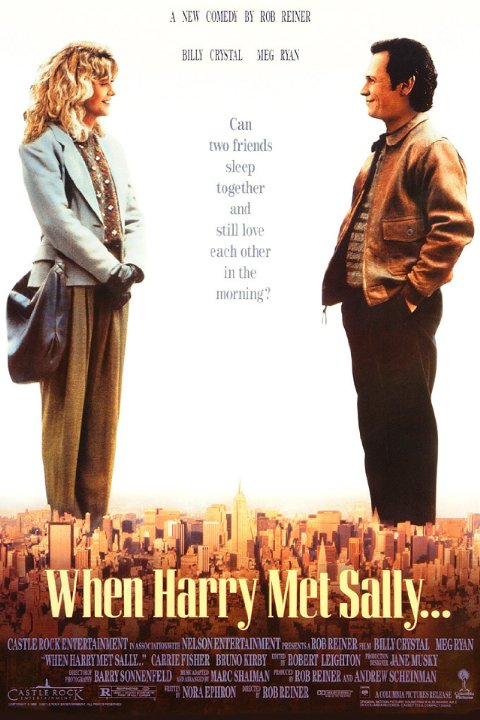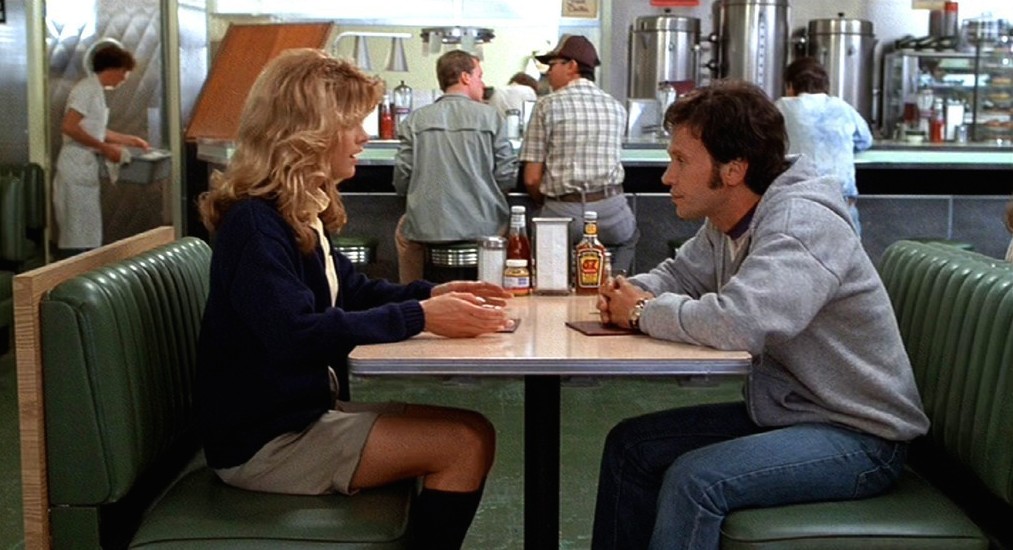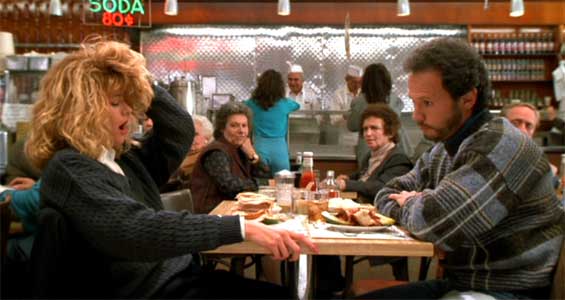When Harry Met Sally... (1989) Food for Thought
 Friday, August 29, 2014 at 5:15PM
Friday, August 29, 2014 at 5:15PM
Anne Marie here on the 25th anniversary of a genre classic.
 It is a truth universally acknowledged, that any romcom made after 1989 owes large thematic debts to When Harry Met Sally… From the Meet Cute to the Bickering Couple to the Final Romantic Gesture (usually involving holidays and/or running), When Harry Met Sally… set a template that has defined an entire genre, and--depending on who you ask--killed that genre as well. But despite the cliches, Rob Reiner and Nora Ephron’s Oscar-nominated comedy script continues to sparkle 25 years later, because it is not a movie about romantic gestures. It is a story about people; their observations, their oversights, and most importantly, their food.
It is a truth universally acknowledged, that any romcom made after 1989 owes large thematic debts to When Harry Met Sally… From the Meet Cute to the Bickering Couple to the Final Romantic Gesture (usually involving holidays and/or running), When Harry Met Sally… set a template that has defined an entire genre, and--depending on who you ask--killed that genre as well. But despite the cliches, Rob Reiner and Nora Ephron’s Oscar-nominated comedy script continues to sparkle 25 years later, because it is not a movie about romantic gestures. It is a story about people; their observations, their oversights, and most importantly, their food.
Watching When Harry Met Sally… for the first time, you’d be forgiven for thinking New Yorkers do nothing but eat and argue. As Harry (Billy Crystal) and Sally (Meg Ryan) meet, separate, meet again, fall into friendship, and fall in love, they do so against an ever-rotating backdrop of restaurants and parties. (Apparently nobody in New York cooks at home either.) A lingering fear in romantic comedies--a genre about bringing people together--is the fear of being alone, and these are public spaces that force the characters to interact with each other and avoid the lonely New York death that Harry jokes about early on. Most importantly, these settings also givethem a chance to eat.

It comes as no surprise that the woman who would write Julie & Julia twenty years later would be so interested in how food reveals character. Ephron establishes both of her young characters through how they eat. Of course, Sally’s infamously detailed instructions to the first waitress immediately brand the young blonde as a perfectionist who likes control. Meg Ryan's best scenes are ordering from the menu, which she does with neither self-consciousness nor self-awareness, making Sally opinionated but not apolagetic, and somehow very funny.
Sally Albright: But I'd like the pie heated and I don't want the ice cream on top, I want it on the side, and I'd like strawberry instead of vanilla if you have it, if not then no ice cream just whipped cream but only if it's real; if it's out of the can then nothing.
Waitress: Not even the pie?
Sally Albright: No, I want the pie, but then not heated.
But Harry is also announced through his food, or rather through his bad manners while eating it. In their very first interaction sharing a car driving into New York, Harry introduces himself to Sally and the audience by talking through a mouthful of masticated grapes, and spitting grape seeds at the window. He’s messy, but he’s relaxed. (Minor characters also interact this way, including a brief fling of Harry's who is wrong for him because she bakes and he hates sweets, and Marie and Jess, who bond on a blind date over an article about wine.) Even when they're eating instead of talking, Harry and Sally are deliberately drawn opposites.

In between bites of food, Harry and Sally work as mouthpieces for Ephron’s musings and philosophies on relationships. When Harry Met Sally… plays as a series of dinner table debates interrupted periodically by plot, sex, or food. It’s a testament to Billy Crystal and Meg Ryan’s charming chemistry that they can make the discussion feel like action, and not just while banging on the table with fake orgasms. Harry and Sally discuss sex, loneliness, real estate, death, the ending of Casablanca, and anything else that pops into Ephron’s mind.
Primarily, they concern themselves with one question: Can men and women remain friends? Or, to update it to 2014, “Is attraction an insurmountable obstacle to friendship?” Twenty five years later, it’s still a question that single people ask themselves. For the last few years, we've been hearing the supposed death knell of the romantic comedy, with the insistence that this genre is too cliche. But the fact that I had the friend vs romantic partner debate last week says to me that this foreboding may be a bit premature. The best new romcoms, like Obvious Child, are movies that carry on Nora Ephron's real legacy: some scattered observations, a question or two, and maybe a little bit of comfort food.



Reader Comments (11)
Nora Ephron is one of those filmmakers whose movies I can never watch without snacks on hand. She really knows how to photograph a meal.
To me this movie will always feel like the greatest TV sitcom ever put on film.
Fluffy, warmed over Woody Allen. Thoroughly enjoyable, thoroughly forgettable.
And when it comes to 1989 and actress performances, the world and me just plainly disagree.
Meg Ryan spends the film straining to impersonate characters and sitcom tropes she's seen other people do (again > on TV). It's such a patchy performance. She attacks individual scenes with gusto (often overshoots) and there's no sense of any real, much less interesting, throughline. Other than a quirky, eyelash-fluttering undercurrent of "please like me! Look how sassy and daffy I can be!"
That orgasm scene is pretty funny, but completely over the top and doesn't gel with the film's register of stylised but still meant-to-be-believable-and-somehow-sharp comedy of manners.
I always used to remember Ryan as the stronger of the leads based on a viewing when I was still in my teens. When I revisited the film a few months ago, I realised Billy Crystal is actually excellent and hits every note effortlessly, hilariously and with charm (to an extent, the same could be said of the supporting cast).
Ryan on the other hand is just busy busy busy the whole time and so exhaustingly self-conscious. There's a strain to every posture she takes up - it always feels like she's on the verge of furtively glancing at the camera to make sure everyone's watching.
Which incidentally is also my problem with all of the non-singing scenes Michelle Pfeiffer has in The Fabulous Baker Boys.
Okay, I understand I am permanently banned from this blog now. I'll show myself out.
any1 feel they shoulda been nominated for oscars.
The incomparable Nora Ephron; brilliant essayist, screenwriter, director, and the best conversationalist a person could wish for. Needless to say I love "When Harry Met Sally".
It's a brilliant script that has stood the test of time. If you doubt her talent, just pick up a collection of her essays, "Wildflower at the Orgy" or "Scribble Scribble". She had an innate sense of humour combined with a gift for a funny phrase, or observation.
Anne Marie, your appreciation of her work is very articulate and insightful, as usual.
If you haven't read any of her essays - do yourself a favour and check them out.
Thanks for your post.
i haven't seen this movie in years and I remember i had some reservations at the time (along the lines Goran is talking about) but it ages really well in the memory at least. And love Nora Ephron's writing.
Ephron liked writing about food. Her first novel which became her first screenplay was Heartburn. Truly a better book than movie but you can see the beginnings of the Ephron didact
Norah Ephron was so much sharper, smarter, and better than so many of the movies she made...except for this one.
A stranger would look at her film work and see a duller, less aesthetically together Nancy Meyers. I hope people keep reading her books and plays and musings about life, because the woman was a true genius.
I am really sorry to say that, but this movie actually sucks. If you want a rom com with real people, a brilliant screenplay, tight direction and perfect actors, go Netflix Moonstruck. And I hate that Ephron became a standard for female romcom sharpness. She's fluffy and superficial, IMO.
Yes! Moonstruck is wonderful, and it hasn't aged a day.
The orgasm scene has always troubled me so much. Sally Albright is one of the most uptight rom com heroines ever. This is a woman who admittedly doesn't have actual sexual fantasies. She would never fake an orgasm in the middle of a crowded restaurant.
My deadly allergy to Meg Ryan prohibits me from watching this. Her scenes in Top Gun burned my retinas.
Moonstruck is the Best Picture of 1987.